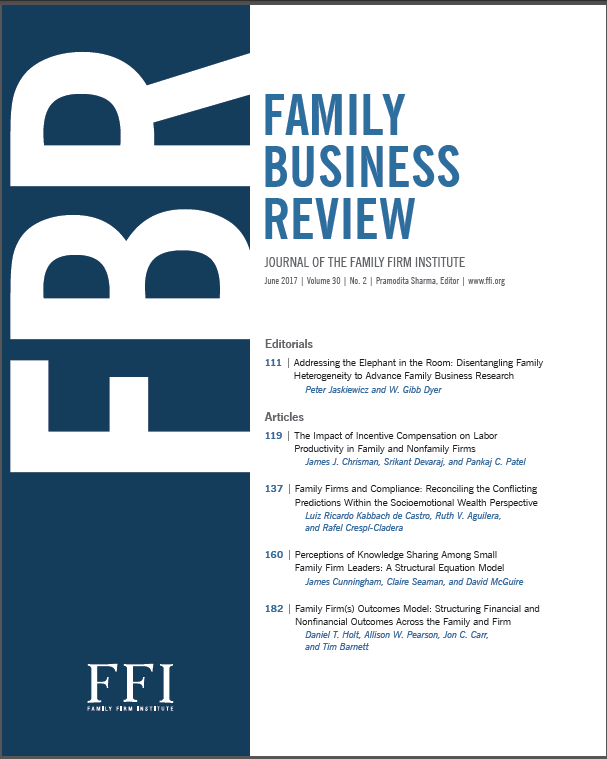家族企业CEO马基雅维利主义与战略联盟
IF 5.6
1区 管理学
Q1 BUSINESS
引用次数: 20
摘要
在本研究中,我们基于高层理论和心理学的见解,认为CEO马基雅维利主义表现在家族企业的联盟行为中。具体而言,我们认为,更多马基雅维利式的首席执行官(CEO)寻求战略联盟,因为这样做提供了操纵、控制和剥削他人的机会,而他们操纵和控制行为的倾向导致联盟的可持续性降低。我们还认为,CEO马基雅维利主义对战略联盟的参与和可持续性的影响受到家族企业运营的影响。由于拥有所有权的家族经常干预并减轻对组织或其领导层的任何担忧,我们认为,随着家族所有权的增加,联盟伙伴对更多马基雅维利式CEO的任何担忧都会减弱;因此,我们认为,随着家族所有权的增加,CEO马基雅维利主义与战略联盟参与之间的正相关关系将更加强烈,而CEO马基雅弗利主义与联盟可持续性之间的负相关关系将不那么强烈。我们的研究提出并测试了一个理论,即更多马基雅维利式的首席执行官如何通过提供家族企业战略联盟决策的新先例来影响战略联盟决策。我们从标准普尔500强公司的样本中找到了对我们论点的支持。本文章由计算机程序翻译,如有差异,请以英文原文为准。
CEO Machiavellianism and Strategic Alliances in Family Firms
In this study, we build on upper echelons theory and insights from psychology to suggest that CEO Machiavellianism is manifested in the alliance behaviors of family firms. Specifically, we argue that more Machiavellian chief executive officers (CEOs) seek out strategic alliances—as doing so provides opportunities to manipulate, control, and exploit others—and that their tendency toward manipulative and controlling behaviors results in less sustainable alliances. We also argue that the effect of CEO Machiavellianism on the engagement and sustainability of strategic alliances is affected by operating in family firms. Since the owning family often intervenes and mitigates any concerns regarding the organization or its leadership, we argue that any concerns that alliance partners have regarding more Machiavellian CEOs will be weaker as family ownership increases; as such, we argue that as family ownership increases, the positive relationship between CEO Machiavellianism and strategic alliance engagement will be more strongly positive while the negative relationship between CEO Machiavellianism and alliance sustainability will be less strongly negative. Our study presents and tests a theory of how more Machiavellian CEOs affect the decisions surrounding strategic alliances by providing a novel antecedent of the decisions surrounding strategic alliances in family firms. We find support for our arguments with a sample of Standard & Poor’s 500 firms.
求助全文
通过发布文献求助,成功后即可免费获取论文全文。
去求助
来源期刊

Family Business Review
BUSINESS-
CiteScore
12.40
自引率
13.60%
发文量
13
期刊介绍:
Family Business Review (FBR) has been a refereed journal since 1988, serving as the premier scholarly publication dedicated to the study of family-controlled enterprises. It delves into the dynamics of these businesses, encompassing a range of sizes from small to very large. FBR concentrates not only on the entrepreneurial founding generation but also on family enterprises in subsequent generations, including some of the world's oldest companies. The journal also publishes interdisciplinary research covering families of wealth, family foundations, and offices.
 求助内容:
求助内容: 应助结果提醒方式:
应助结果提醒方式:


